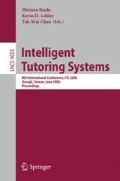Abstract
Self-efficacy is an individual’s belief about her ability to perform well in a given situation. Because self-efficacious students are effective learners, endowing intelligent tutoring systems with the ability to diagnose self-efficacy could lead to improved pedagogy. Self-efficacy is influenced by (and influences) affective state. Thus, physiological data might be used to predict a students’ level of self-efficacy. This paper investigates an inductive approach to automatically constructing models of self-efficacy that can be used at runtime to inform pedagogical decisions. In an empirical study, two families of self-efficacy models were induced: a static model, learned solely from pre-test (non-intrusively collected) data, and a dynamic model, learned from both pre-test data as well as runtime physiological data collected with a biofeedback apparatus. The resulting static model is able to predict students’ real-time levels of self-efficacy with reasonable accuracy, while the physiologically informed dynamic model is even more accurate.
Access this chapter
Tax calculation will be finalised at checkout
Purchases are for personal use only
Preview
Unable to display preview. Download preview PDF.
References
André, E., Mueller, M.: Learning affective behavior. In: Proceedings of the 10th International Conference on Human-Computer Interaction, pp. 512–516. Lawrence Erlbaum, Mahwah (2003)
Bandura, A.: Exercise of personal and collective efficacy in changing societies. In: Bandura, A. (ed.) Self-efficacy in changing societies, pp. 1–45. Cambridge University Press, New York (1995)
Bandura, A.: Self-efficacy: The exercise of control. Freeman, New York (1997)
Bandura, A.: Guide for constructing self-efficacy scales. Unpublished manuscript (2005)
Baylor, A.L., Kim, Y.: Pedagogical agent design: The impact of agent realism, gender, ethnicity, and instructional role. In: Lester, J.C., Vicari, R.M., Paraguaçu, F. (eds.) ITS 2004. LNCS, vol. 3220, pp. 592–603. Springer, Heidelberg (2004)
Beal, C., Lee, H.: Creating a pedagogical model that uses student self reports of motivation and mood to adapt ITS instruction. In: Workshop on Motivation and Affect in Educational Software, in conjunction with the 12th International Conference on Artificial Intelligence in Education (2005)
Burleson, W., Picard, R.: Affective agents: Sustaining motivation to learn through failure and a state of stuck. In: Workshop of Social and Emotional Intelligence in Learning Environments, in conjunction with the 7th International Conference on Intelligent Tutoring Systems (2004)
Conati, C., Maclaren, H.: Data-driven refinement of a probabilistic model of user affect. In: Ardissono, L., Brna, P., Mitrović, A. (eds.) UM 2005. LNCS, vol. 3538, pp. 40–49. Springer, Heidelberg (2005)
Delcourt, M., Kinzie, M.: Computer technologies in teacher education: the measurement of attitudes and self-efficacy. Journal of Research and Development in Education 27(1), 35–41 (1993)
Graham, S., Weiner, B.: Principles and theories of motivation. In: Berliner, D., Calfee, R. (eds.) Handbook of educational psychology, pp. 63–84. MacMillan Publishing, New York (1996)
Gratch, J., Marsella, S.: A domain-independent framework for modeling emotion. Journal of Cognitive Systems Research 5(4), 269–306 (2004)
Hanley, J., McNeil, B.: The meaning and use of the area under the Receiver Operating Characteristic (ROC) curve. Radiology 143, 29–36 (1982)
Johnson, W.L., Rizzo, P.: Politeness in tutoring dialogs: “Run the factory, that’s what i’d do”. In: Lester, J.C., Vicari, R.M., Paraguaçu, F. (eds.) ITS 2004. LNCS, vol. 3220, pp. 67–76. Springer, Heidelberg (2004)
Kim, Y.: Empathetic virtual peers enhanced learner interest and self-efficacy. In: Workshop on Motivation and Affect in Educational Software, in conjunction with the 12th International Conference on Artificial Intelligence in Education (2005)
Lepper, M., Woolverton, M., Mumme, D., Gurtner, J.: Motivational techniques of expert human tutors: Lessons for the design of computer-based tutors. In: Lajoie, S., Derry, S. (eds.) Computers as cognitive tools, pp. 75–105. Erlbaum, Hillsdale (1993)
Lester, J., Towns, S., FitzGerald, P.: Achieving affective impact: Visual emotive communication in lifelike pedagogical agents. The International Journal of Artificial Intelligence in Education 10(3-4), 278–291 (1999)
Padilla, M., Miaoulis, I., Cyr, M.: Science Explorer: Cells and Heredity. Teacher’s Edition. Prentice Hall, Upper Saddle River (2000)
Paiva, A., Dias, J., Sobral, D., Aylett, R., Woods, S., Hall, L., Zoll, C.: Learning by feeling: Evoking empathy with synthetic characters. Applied Artificial Intelligence 19, 235–266 (2005)
Pajares, F., Kranzler, J.: Self-Efficacy beliefs and general mental ability in mathematical problem solving. Contemporary Educational Psychology 20, 426–443 (1995)
Porayska-Pomsta, K., Pain, H.: Providing Cognitive and Affective Scaffolding Through Teaching Strategies: Applying Linguistic Politeness to the Educational Context. In: Lester, J.C., Vicari, R.M., Paraguaçu, F. (eds.) ITS 2004. LNCS, vol. 3220, pp. 77–86. Springer, Heidelberg (2004)
Prendinger, H., Ishizuka, M.: The empathic companion: A character-based interface that addresses users affective states. Applied Artificial Intelligence 19, 267–285 (2005)
Schunk, D., Pajares, F.: The development of academic self-efficacy. In: Wigfield, A., Eccles, J. (eds.) Development of achievement motivation, pp. 15–31. Academic Press, San Diego (2002)
Witten, I., Frank, E.: Data Mining: Practical machine learning tools and techniques, 2nd edn. Morgan Kaufman, San Francisco (2005)
de Vicente, A., Pain, H.: Informing the detection of the students’ motivational state: An empirical study. In: Cerri, S.A., Gouardéres, G., Paraguaçu, F. (eds.) ITS 2002. LNCS, vol. 2363, pp. 933–943. Springer, Heidelberg (2002)
Zimmerman, B.: Self-efficacy: an essential motive to learn. Contemporary Educational Psychology 25, 82–91 (2000)
Author information
Authors and Affiliations
Editor information
Editors and Affiliations
Rights and permissions
Copyright information
© 2006 Springer-Verlag Berlin Heidelberg
About this paper
Cite this paper
McQuiggan, S.W., Lester, J.C. (2006). Diagnosing Self-efficacy in Intelligent Tutoring Systems: An Empirical Study. In: Ikeda, M., Ashley, K.D., Chan, TW. (eds) Intelligent Tutoring Systems. ITS 2006. Lecture Notes in Computer Science, vol 4053. Springer, Berlin, Heidelberg. https://doi.org/10.1007/11774303_56
Download citation
DOI: https://doi.org/10.1007/11774303_56
Publisher Name: Springer, Berlin, Heidelberg
Print ISBN: 978-3-540-35159-7
Online ISBN: 978-3-540-35160-3
eBook Packages: Computer ScienceComputer Science (R0)

